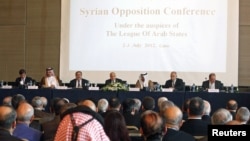CAIRO — Syrian opposition leaders and Arab diplomats began a two-day conference in Cairo Monday under the auspices of the Arab League to consider measures to step up pressure against the government of President Bashar al-Assad.
While urging opposition figures to unite, Arab League chief Nabil Elaraby blasted Mr. Assad for flouting written agreements and resorting to military might rather than political means. He said it is impossible to ignore the heavy-handed tactics that the regime has employed against its people.
Veteran Palestinian diplomat Nasser El-Kidwa, who is the U.N. and Arab League's deputy special envoy to Syria, insisted that the international community is working to put an end to violence and broker a political process.
He said last week's gathering of the five permanent U.N. Security Council nations in Geneva vowed to work diligently to end violence and start an interim political process that will fulfill the aspirations of the Syrian people and lead to a democratic future.
Syrian opposition figure Rima Fleihan said she and her colleagues are against dealing with the Assad regime, adding that it belongs to the past. She said "the regime is over" and that it is a mistake to think that the opposition will allow any part of it to remain in place. The Syrian people, she insisted, have chosen to topple the regime and seek a multi-party democracy.
Well-known opposition figure Haitham al Maleh told journalists that he also opposes any dialogue with the Assad government, insisting that "matters will be settled on the ground militarily by the Free Syrian Army."
The Cairo conference is the first Arab League gathering that has specifically invited Syrian opposition figures. Despite the gesture, the rebel Free Syrian Army issued a statement inside Syria insisting it will "refuse all sorts of dialogue or negotiations" with what it called the "killer gangs" of the Assad regime.
Hilal Khashan, who teaches political science at the American University of Beirut, said most of the recent meetings of the Syrian opposition and of the international contact groups have been a failure.
"In view of the past failures, be it on the part of the international community or the Syrian opposition, I have real doubts whether this meeting in Cairo under the auspices of the Arab League will make any difference," Khashan said.
While urging opposition figures to unite, Arab League chief Nabil Elaraby blasted Mr. Assad for flouting written agreements and resorting to military might rather than political means. He said it is impossible to ignore the heavy-handed tactics that the regime has employed against its people.
Veteran Palestinian diplomat Nasser El-Kidwa, who is the U.N. and Arab League's deputy special envoy to Syria, insisted that the international community is working to put an end to violence and broker a political process.
He said last week's gathering of the five permanent U.N. Security Council nations in Geneva vowed to work diligently to end violence and start an interim political process that will fulfill the aspirations of the Syrian people and lead to a democratic future.
Syrian opposition figure Rima Fleihan said she and her colleagues are against dealing with the Assad regime, adding that it belongs to the past. She said "the regime is over" and that it is a mistake to think that the opposition will allow any part of it to remain in place. The Syrian people, she insisted, have chosen to topple the regime and seek a multi-party democracy.
Well-known opposition figure Haitham al Maleh told journalists that he also opposes any dialogue with the Assad government, insisting that "matters will be settled on the ground militarily by the Free Syrian Army."
The Cairo conference is the first Arab League gathering that has specifically invited Syrian opposition figures. Despite the gesture, the rebel Free Syrian Army issued a statement inside Syria insisting it will "refuse all sorts of dialogue or negotiations" with what it called the "killer gangs" of the Assad regime.
Hilal Khashan, who teaches political science at the American University of Beirut, said most of the recent meetings of the Syrian opposition and of the international contact groups have been a failure.
"In view of the past failures, be it on the part of the international community or the Syrian opposition, I have real doubts whether this meeting in Cairo under the auspices of the Arab League will make any difference," Khashan said.




